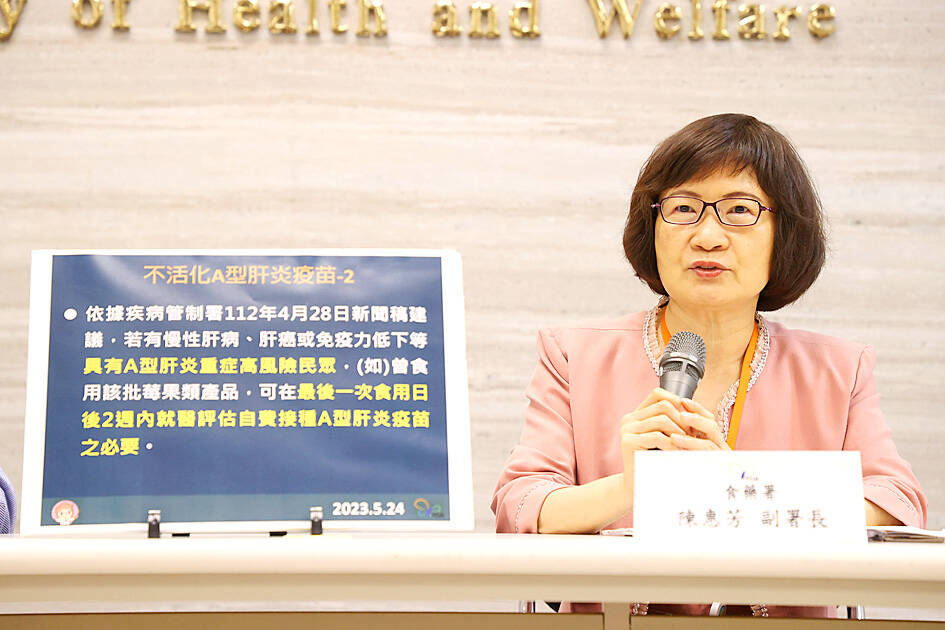While liquid bandage products are handy, some precautions should be taken, and people with a glucose-6-phosphate dehydrogenase (G6PD) deficiency should avoid them, as they contain an ingredient that might trigger hemolytic anemia in people with the condition, the Food and Drug Administration (FDA) said yesterday.
Liquid bandages create a waterproof clear shield over a wound, protecting it from germs and dirt to help prevent skin infection.
As they are classified as a medical device in Taiwan, manufacturers or importers of liquid bandages require a permit obtained from the Ministry of Health and Welfare, and only those with a medical device dealer’s permit can sell the products, FDA Deputy Director Cheng Hwei-fang (陳惠芳) said.

Photo: CNA
Liquid bandages are a sterile liquid, semi-liquid, or powder and liquid combination used to cover a skin wound, FDA Medical Device and Cosmetics Division section chief Lin Hsiu-te (林修德) said.
They mainly come in two forms — brush-on and spray — and have the advantage of covering areas that are difficult to cover with traditional plastic or fabric plasters, such as the knuckles or between the fingers, he said.
However, liquid bandages should not be used on larger wounds, scrapes, ulcers, festering wounds or burns, Lin said, adding that people should also avoid applying them near their eyes or nose, or on the mucosa or sensitive skin.
Moreover, as liquid bandages mostly contain pyroxyline, benzyl alcohol and camphor, people with a G6PD deficiency should avoid using them, he said.
Exposure to camphor might trigger acute hemolytic anemia — a blood disorder in which red blood cells are destroyed faster than they can be made — in people with a G6PD deficiency, he said.
People should follow the three safety steps for using medical devices: “recognizing” the products as a medical device, “checking” if the outer package of the product has an approval number from the health ministry and “reading” the instruction leaflet for proper use of the device, Chen said.

Japanese footwear brand Onitsuka Tiger today issued a public apology and said it has suspended an employee amid allegations that the staff member discriminated against a Vietnamese customer at its Taipei 101 store. Posting on the social media platform Threads yesterday, a user said that an employee at the store said that “those shoes are very expensive” when her friend, who is a migrant worker from Vietnam, asked for assistance. The employee then ignored her until she asked again, to which she replied: "We don't have a size 37." The post had amassed nearly 26,000 likes and 916 comments as of this

US President Donald Trump said "it’s up to" Chinese President Xi Jinping (習近平) what China does on Taiwan, but that he would be "very unhappy" with a change in the "status quo," the New York Times said in an interview published yesterday. Xi "considers it to be a part of China, and that’s up to him what he’s going to be doing," Trump told the newspaper on Wednesday. "But I’ve expressed to him that I would be very unhappy if he did that, and I don’t think he’ll do that," he added. "I hope he doesn’t do that." Trump made the comments in

Tourism in Kenting fell to a historic low for the second consecutive year last year, impacting hotels and other local businesses that rely on a steady stream of domestic tourists, the latest data showed. A total of 2.139 million tourists visited Kenting last year, down slightly from 2.14 million in 2024, the data showed. The number of tourists who visited the national park on the Hengchun Peninsula peaked in 2015 at 8.37 million people. That number has been below 2.2 million for two years, although there was a spike in October last year due to multiple long weekends. The occupancy rate for hotels

A cold surge advisory was today issued for 18 cities and counties across Taiwan, with temperatures of below 10°C forecast during the day and into tonight, the Central Weather Administration (CWA) said. New Taipei City, Taipei, Taoyuan and Hsinchu, Miaoli and Yilan counties are expected to experience sustained temperatures of 10°C or lower, the CWA said. Temperatures are likely to temporarily drop below 10°C in most other areas, except Taitung, Pingtung, Penghu and Lienchiang (Matsu) counties, CWA data showed. The cold weather is being caused by a strong continental cold air mass, combined with radiative cooling, a process in which heat escapes from